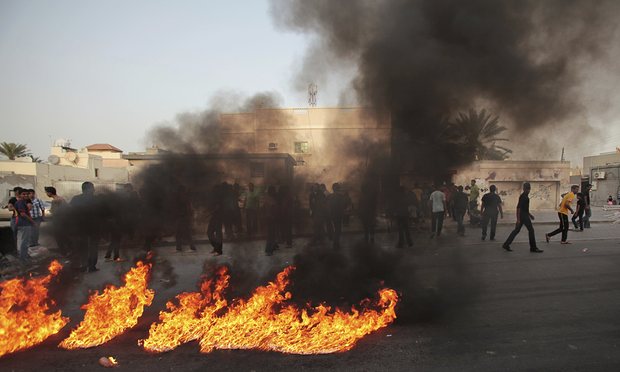UK urged to loosen ties with Gulf nation as protesters claim confession was extracted under torture and men’s trial was sham
Britain is facing calls to loosen its ties with Bahrain after three Shia Muslim men convicted of killing an Emirati police officer and two Bahraini police officers in a 2014 bomb attack were executed.
The death sentences on Sunday were the first to be carried out in Bahrain since 2010, and protesters claimed that confessions were extracted under torture.
There were street protests in Bahrain following the executions, the first of Bahrainis since 1996, and it remains to be seen how the UK Foreign Office reacts. Britain opposes the death penalty and says it has been working to improveBahrain’s human rights record.
Maya Foa, the director of the death penalty team at Reprieve, said: “It is nothing short of an outrage and a disgraceful breach of international law that Bahrain has gone ahead with these executions. The confessions were extracted through torture and the trial was an utter sham.
“It would be shameful if the UK continued to support Bahrain’s security apparatus and interior ministry in the face of such terrible abuses.”
Agnes Callamard, the UN special rapporteur on extrajudicial executions, tweeted:
#Bahrain executed Abbas al-Samea, Ali al-Singace, Sami Mushaima. Torture, unfair trial + flimsy evidence: these are extrajudicial killings
The executions came less than a week after the country’s highest court confirmed the punishment against Abbas al-Samea, 27, Sami Mushaima, 42, and Ali al-Singace, 21. The court found there was “no evidence of coercion in the case documents”.
The three men had been charged with “organising, running and financing a terrorist group [al-Ashtar Brigade] with the aim of carrying out terrorist attacks”. They were also accused of “possession and planting of explosives with the intention to kill”.
Mushaima is said to be largely illiterate, while Samea was arrested three hours after the bombing incident. It is also claimed by their supporters that Samea was subjected to beatings, electric shocks, and deprivation of food and water.
State news agency BNA said the men were executed by firing squad in the presence of a judge, a doctor and a Muslim cleric. When their families went to see the men for the last time, they were subjected to police intimidation, it is claimed.
The Arab spring demonstrations led by Bahrain’s Shia majority were crushed by the Sunni-ruled government with help from its Gulf Arab neighbours in February 2011.
In the past year, Bahrain has instituted a crackdown on Shias – imprisoning the most senior rights campaigner, closing the main opposition group, al-Wefaq, and revoking the citizenship of the community’s spiritual leader.
Over the past four years, the UK has spent millions training Bahraini police and helping with the independent police ombudsman. The UK insists it is working to improve the judicial and police system, but critics say the money has turned largely into a front so Britain can expand a naval base in Bahrain largely funded by Manama.
The foreign secretary, Boris Johnson, issued a statement on Sunday, which said: “The UK is firmly opposed to the death penalty and it is our longstanding position to oppose capital sentences in all circumstances. The Bahraini authorities are fully aware of our position and I have raised the issue with the Bahraini government.”
Sayed Ahmed Alwadaei of the Bahrain Institute for Rights and Democracy called on Britain to institute a complete arms ban until human rights changes have been implemented. He said Bahrain was becoming a security threat to the region.


